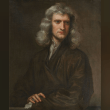
Isaac Newton
Invite people to rateEnglish mathematician, physicist, astronomer, alchemist, theologian, and author who was described in his time as a "natural philosopher" Website
Approval Rate: 91%
Trend
Statistics
Reviews 0
by magneticd
Fri Oct 08 2010I, for one, do not believe in gravity. Other than that minor bit, I'm pretty sure Newton was the most important man in history (for positive contributions). Jerks like Hitler, Saul and Al-Walid the First have left some pretty significant marks on the World though. You can teach your kids that whatever they do, they should try their hardest at it, but look what happens when you just have a rotten kid!
by myhistory
Mon Oct 04 2010An unlikeable personality, Newton possessed greater mathematical insight than perhaps any other man in history. Other contemporaries such as Robert Hooke and Edmond Halley generated some ideas useful to Newton, but lacked Newton's power to describe natural phenomena using mathematics. The world is not deterministic, and most natural laws are not as simple as Newton's laws, but his breakthroughs took humanity a long way -- while leaving room for wonder and piety.
by oscargamblesfr_o
Fri Apr 24 2009Facebook review: LOL. Don't like his figs.
by twansalem
Tue May 13 2008Much more important that the average person realizes. While Newton admittedly did fairly little of his own scientifc research, his major importance was bringing together all of what had been done, and relating it to each other. Newton's Laws, while now known to not be absolutely correct, are still amazingly accurate in the non-relativistic, non-quantum limit. In addition to his study of gravity and forces in general, Newton also made major contributions to optics, and he also formulated calculus at about the same time as Leibniz.
by cyclee
Tue May 13 2008The one who came up with the idea of gravity, or gravitational acceleration, has got to be important. Just look at how many of us still believe in this theory.
by supremecritic
Wed Sep 13 2006the man who invented modern physics, despite putting mathmatics behind for years by destroying his rivals work. one of the true genius's in history
by drummond
Sun Jan 08 2006His brilliance and the profound impact of his scientific revelations exceeds even Einstein's. Azimov rates him the most remarkable scientist in history.
by the_biggun
Wed Nov 23 2005The law of love casts a long shadow on the laws of gravity. Sorry Mr. Newton. Jesus gets my vote.
by michigantutor
Tue Nov 22 2005The greatest genius and the most influential scientist ever. If it were not for his originality and synthesis of the laws of nature the world would have been at least a 100 years behind. Laws of motion postponed a 100 years means laws of the electrons (quantum mechanics) postponed a 100, and hence microelectronics postponed a 100 years. I am glad I did not have to wait until the twenty second century to use a computer.
by canadasucks
Sat Oct 29 2005Absolutely stunning resume. . .used language and mathematics to create the laws of physics we still use today, was an astronomer, invented calculus because normal mathematic funcions were too primitive for astronomy (don't e-mail me about Liebnitz, I'm aware), invented equations we still use today, helped clarify concepts of gravity and inertia which held back science during the Middle Ages. . .Newton is in the Hall of Fame for smart people. ..
by abichara
Fri Jun 17 2005One of the pre-eminent founders of the scientific revolution, Isaac Newton made foundational discoveries in mathematics, astronomy and chemistry. His religious and philosophical views, like John Locke's, his contemporary, were critical in bringing about the rise of the Enlightenment. But ultimately the strongest part of his legacy lies with the development of the laws of motion and gravity which have proved to be at the foundation of modern physics. Along with Leibniz, he developed calculus, which proved critical in measuring distances and rates of change. His treatises on the movement of celestial bodies had an enormous impact on religious thought as well. Contrary to popular belief, especially at the time, Newton did not seek to discredit religion. He always claimed that gravity might explain the motions of the planets, but it doesn't explain who put them there, a point that should not be lost on many religious folks today who are anti-science. Newton's brought together the knowledge... Read more


